MISS MATCH MISMATCH
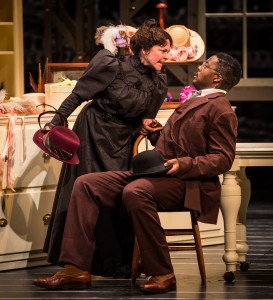 Though it’s usually the other way around, sometimes musicals actually improve on the sources that inspire them. Arguably, West Side Story is stronger stuff than Romeo and Juliet, She Loves Me a warmer show than Parfumerie, The Boys from Syracuse a fresher take on folly than A Comedy of Errors, and, most definitely, Kiss Me Kate rises above the crude misogyny of Taming of the Shrew.
Though it’s usually the other way around, sometimes musicals actually improve on the sources that inspire them. Arguably, West Side Story is stronger stuff than Romeo and Juliet, She Loves Me a warmer show than Parfumerie, The Boys from Syracuse a fresher take on folly than A Comedy of Errors, and, most definitely, Kiss Me Kate rises above the crude misogyny of Taming of the Shrew.
Add to the catalogue of inferior originals Thornton Wilder’s four-act period piece’”1955’s The Matchmaker (a comedy derived from his even worse 1938 The Merchant of Yonkers). Hello Dolly!, Michael Stewart and Jerry Herman’s spin-off hit, doesn’t just ground Wilder’s addlepated silliness (so alien to the gallows humor and breadth of vision in his Our Town and The Skin of Our Teeth) in celebratory songs. Treasures like “Put On Your Sunday Clothes,” “Ribbons Down My Back,” and “Before the Parade Passes By” lighten Matchmaker’s sardonic load and distract from its disconcerting slapstick. Worse, compared to the 1964 musical, the last acts of Matchmaker are mired in eccentric dialogue, clumsily constructed, and crudely resolved. Goodbye, Dolly.
Unevenly performed, lumbered with charm-challenged casting, heavy-handed with monumentally-milked physical comedy, Henry Wishcamper’s 160-minute Goodman Theatre revival manages to be both insistent and half-hearted. It puts all the play’s flaws on dress parade: The wisdom gets lost in farcical flapdoodle. The fun seems formulaic. Worse, any chemistry between the eight love-seekers is never organic.
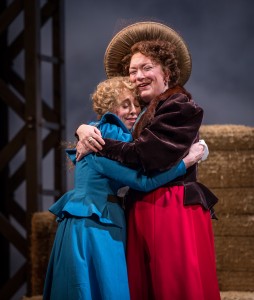 And yet The Matchmaker was penned by miracle-maker Thornton Wilder. So, yes, there is the delightful apostrophe/ soliloquies from the principals about not having two vices at the same time. The play also highlights the need to marvel at the adventures life offers to all ages and the way we can cherish past love without sacrificing future passion. Set in 1896, the plot centers on the title fortune huntress, Dolly Gallagher Levi. Rich with machination, this mischievous meddler has gold-digging designs on curmudgeonly widower Horace Vandegelder, an overly rich Yonkers feed merchant. (He will be married next week, she declares, disingenuously leaving out the name of the bride.) The merry widow sets her cap for (or sinks her teeth into) the cranky, miserly, mini-mogul: It’s how Dolly means to redistribute the wealth, “Money,” she says, “is like manure; it’s not worth a thing unless it’s spread around encouraging young things to grow” (a familiar joke that the yuck-crazed opening night crowd greeted like revelation).
And yet The Matchmaker was penned by miracle-maker Thornton Wilder. So, yes, there is the delightful apostrophe/ soliloquies from the principals about not having two vices at the same time. The play also highlights the need to marvel at the adventures life offers to all ages and the way we can cherish past love without sacrificing future passion. Set in 1896, the plot centers on the title fortune huntress, Dolly Gallagher Levi. Rich with machination, this mischievous meddler has gold-digging designs on curmudgeonly widower Horace Vandegelder, an overly rich Yonkers feed merchant. (He will be married next week, she declares, disingenuously leaving out the name of the bride.) The merry widow sets her cap for (or sinks her teeth into) the cranky, miserly, mini-mogul: It’s how Dolly means to redistribute the wealth, “Money,” she says, “is like manure; it’s not worth a thing unless it’s spread around encouraging young things to grow” (a familiar joke that the yuck-crazed opening night crowd greeted like revelation).
In the process, this “woman who arranges things” engineers seemingly successful liaisons between Horace’s browbeaten head clerk Cornelius Hackl and the sensation-seeking milliner Irene Molloy, between dogsbody Barnaby Tucker and shop assistant Minnie Fay, and between Horace’s ingénue of a niece Ermengarde and earnest artist Ambrose Kemper. Whether at Horace’s warehouse/manse, Irene’s head-dress emporium, the not so elegant Harmonia Gardens restaurant on the Battery, or Flora Van Huysen’s midtown mansion (a perfectly pointless place, eliminated in the musical), Wilder employs broadly drawn mistaken identities, contrived disguises, and split-second prevarications. The goal: to shield these suburban “adventurers” from their too-human blunders. (Love isn’t so much blind as clumsy.) Wilder’s message prevails: If you take a chance on life to prove you’ve got it, you rejoin the human race.
In the fourth act, alas, the comedy really sours. At least in Hello Dolly! we come full circle and return to Yonkers to clean up the complications. But in Matchmaker the scenery-chewing tomfoolery of the surprisingly rowdy Harmonia Gardens action is merely repeated in an utterly unnecessary setting. It’s the Orientalized abode of Flora, a daffy/dotty/dippy friend of Horace’s late wife who’s a lot more fascinated than we are by the lovers’ stratagems and subterfuges. Inevitably, doggedly pursuing “pleasure and profit,” Dolly, better as a matchmaker than a homewrecker, gets her way, the latest of life’s (or love’s) little victories.
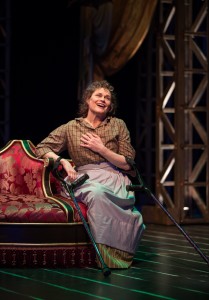 No Carol Channing, Ruth Gordon, Shirley Booth or even Barbra Streisand (previous Dollies), Kristine Nielsen exudes a busybody’s bumptiousness. Her rubber face works overtime. But this Dolly plays her hands too blatantly, telegraphing and mugging Dolly’s every reversal and frustration. There’s dramatic contrast but no comic byplay between Nielsen’s fussbudget “fixer” and Allen Gilmore’s deadly-dry Horace, a sourpuss whose first and final smile (as he woodenly proposes) comes out of nowhere and returns there.
No Carol Channing, Ruth Gordon, Shirley Booth or even Barbra Streisand (previous Dollies), Kristine Nielsen exudes a busybody’s bumptiousness. Her rubber face works overtime. But this Dolly plays her hands too blatantly, telegraphing and mugging Dolly’s every reversal and frustration. There’s dramatic contrast but no comic byplay between Nielsen’s fussbudget “fixer” and Allen Gilmore’s deadly-dry Horace, a sourpuss whose first and final smile (as he woodenly proposes) comes out of nowhere and returns there.
The supporting roles are perfunctory when not forced. Postell Pringle has brittle fun as Cornelius. Behzad Dabu delivers humble hilarity as virginal Barnaby. As their chosen girlfriends, Elizabeth Ledo and Sydney Germaine are sprightly silly and intermittently endearing. But, as Ermengarde and Ambrose, Theo Allyn and Ronobir Lahiri make a perfectly unremarkable couple. Veteran actor Marc Grapey lays it on thick as Malachi, a reluctant rogue happily excised in the musical. Least of all, Marilyn Dodds Frank brings her reliable airhead vacuousness to the irrelevant role of Flora Van Huysen. Send out the clowns.
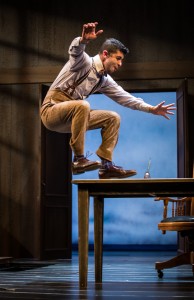 Dwarfed by set designer Neill Patel’s irritatingly omnipresent elevated tracks, the four settings seem strangely sparse, despite the many busy pop-up props. Jenny Mannis’s festive costumes prove merrier than the action. The occasional period songs, like an exquisite waltz version of “After the Ball Is Over,” convey a nostalgia the play can only pretend to earn.
Dwarfed by set designer Neill Patel’s irritatingly omnipresent elevated tracks, the four settings seem strangely sparse, despite the many busy pop-up props. Jenny Mannis’s festive costumes prove merrier than the action. The occasional period songs, like an exquisite waltz version of “After the Ball Is Over,” convey a nostalgia the play can only pretend to earn.
Goodman Theatre touts Matchmaker as an “outrageous comedy.” That’s the problem. However pretty to behold and sometimes behear, this premediated production remains contrivedly calculated for shock effects (and not of recognition) that don’t detonate. And–yet, still, notwithstanding’”The Matchmaker is the last labor of love from Thornton Wilder. Even his lesser efforts beat 2016 trifles hands down.
photos by Liz Lauren
The Matchmaker
Goodman Theatre
Albert Theatre, 170 North Dearborn
ends on April 10, 2016
for tickets, call 312.443.3800 or visit Goodman Theatre
for more theater info, visit Theatre in Chicago
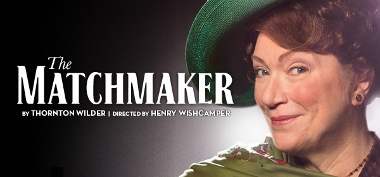
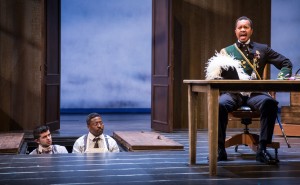
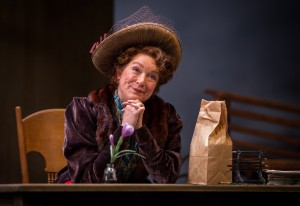
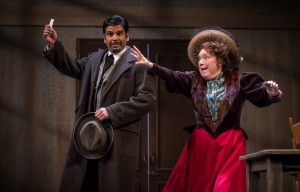

{ 4 comments… read them below or add one }
I was a visitor to Chicago from San Francisco when I saw The Matchmaker over the weekend. Are you sure we were watching the same play? I thought it was delightful! This is about lightening up, and enjoying the fun that the audience and (clearly) the actors had … take to heart some of Wilder’s life lessons.
Yes. I saw the same show. But, compared to Hello, Dolly!, Goodman’s tepid revival is forced and meretricious and the play is mostly a creaking bore.
I thought this was a very good production, and many of the performances were outstanding. All in all, this is an excellent night at the theater, seeing an original work brought back to life in an original way. The snarky review is not warranted; if you want to see Hello, Dolly!, Carol Channing and Barbara Streisand, get a DVD player. If you want to see some original theater that is at times as hilarious as, and maybe an original inspiration for, the Marx Brothers, this is something to see.
I haven’t seen this production, Mark – but the height of the Marx Brothers’ popularity (on stage and in the cinema) ended about two decades before The Matchmaker was written. Did you mean to say that Thornton Wilder was inspired by the comedy team?